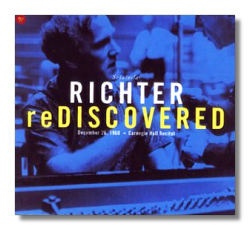
The Internet's Premier Classical Music Source
Related Links
- Latest Reviews
- More Reviews
-
By Composer
-
Collections
DVD & Blu-ray
Books
Concert Reviews
Articles/Interviews
Software
Audio
Search Amazon
Recommended Links
Site News
 CD Review
CD Review
Richter Rediscovered

Carnegie Hall Recital: December 26, 1960
- Claude Debussy: Prélude "Les Collines d'Anacapri", Book I #5
- Franz Joseph Haydn: Sonata in C Major, Hob. XVI/50
- Frédéric Chopin:
- Ballade #3 in A Flat Major, Op. 47, B. 136
- Étude #10 in A Flat Major, Op. 10/10, B. 42/3
- Étude #12 in C minor "Revolutionary" / "Fall of Warsaw", Op. 10/12, B. 67
- Mazurka #15 in C Major, Op. 24/2, B. 89/2
- Scherzo #4 in E Major, Op. 54, B. 148
- Maurice Ravel:
- Jeux d'eau
- Miroirs #5, La Vallée des Cloches
- Serge Prokofieff:
- Piano Sonata #6 in A Major" War Sonata 1", Op. 82
- Visions fugitives, Op. 22
- Sergei Rachmaninoff:
- Prélude #2 in F Sharp minor, Op. 23/1
- Prélude #20 in A Major, Op. 32/9
- Prélude #21 in B minor, Op. 32/10
- Prélude #23 in G Sharp Major, Op. 32/12
Sviatoslav Richter, piano
RCA Red Seal 09026-63844-2 ADD 2CDs: 62:07, 50:54
Several years after his death, mercurial Soviet pianist Sviatoslav Richter continues to be the subject of intense adulation. This release, then, will be of great interest to many collectors, particularly because most of what has been included here never has seen light of day on a commercial LP or CD. Columbia Records, now Sony, recorded the pianist's Carnegie Hall concerts from October 1960. These recordings, however, were not done in stereo, did not receive the pianist's approval, and continue to remain elusive in any format. On the other hand, this December 26 recital was recorded in stereo by RCA Victor, and Richter sanctioned it for official release. Why it hasn't been released until now is not entirely clear, although I have my suspicions. (See below.) The label had planned to release part of it in 1961 with other live material, but the album never appeared. (Encores from the Mosque Theatre in Newark two nights later fill the second disc of this set, and some of these were included on LPs released in 1965 and 1970.)
One of the people sitting in Carnegie Hall on December 26 was critic Harris Goldsmith. His contribution to this release is a brief and relatively objective essay of his impressions then and now. A New York Times essay by Harold C. Schonberg from January 1961 also has been included. Surprisingly, Schonberg is less complimentary, calling Richter an "erratic artist" and he adds that "in some respects his playing tends to be provincial." Still, Schonberg seems to feel that Richter's faults were more interesting and promising than other pianists' virtues. Such candor was welcome then, and it is even more welcome today – perhaps RCA feels that Richter is a "pre-sold" star pianist, and that no words of caution can restrain his fans. This probably is correct.
My impressions are those of a listener who respects much (but not all) of Richter's work, not those of an unquestioning fan. This is a recital that deserved to be reissued, but it has some faults. The Haydn sonata (#60 in C) is unpleasantly brittle, and Richter doesn't find the needed poise and stillness for Ravel's Jeux d'eau and La Vallée des Cloches and (albeit less so) Debussy's Les Collines d'Anacapri. Chopin's Fourth Scherzo and Third Ballade are far more stylish, although the "style" in question is that of the early 20th century (think Rachmaninoff), not that of the mid-19th century. The Newark Chopin encores (two études and a mazurka) are crowd-pleasers for sure. Speaking of Rachmaninoff, the four Préludes included here (Op. 23, #1; Op. 32, #9, 10, and 12) are beyond reproach – not far in spirit for the composer's own interpretations. The highlights of these discs are the Prokofieff selections: the Sixth Sonata, a selection of Visions fugitives, and the Cinderella Gavotte. No one after Richter has mined the lyricism in this music without shortchanging its relentlessness. These are treasurable readings.
I suspect the Carnegie Hall recital has remained unreleased until now because of the sound. Digital remastering technology probably has improved it, but there's no getting around the somewhat dismaying fact that the piano tone is hard and sometimes distorted. One wonders at times whether the piano is even in tune. Tellingly, the Mosque Theatre material – which has been released before – sounds better. Richter's studio recordings are more complimentary. Still, they don't tell the whole story, and this Carnegie Hall recital, flawed as it is, is too important to reject out of hand. Take it as a piece of evidence, not as the whole case.
Copyright © 2002, Ray Tuttle


















